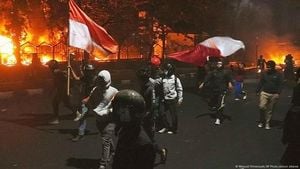A stark warning from the U.S. Treasury has sent ripples through India’s banking sector, urging institutions to reconsider their engagements with Russia's military-industrial base. In a letter addressed to the Indian Banks' Association, Deputy Treasury Secretary Wally Adeyemo laid bare the ramifications of such dealings – a potential loss of access to the vital U.S. financial system for banks that facilitate transactions involving sensitive goods for the Russian military.
Adeyemo's communication outlined a clear picture: the Russian military not only relies on imports of crucial items, including machine tools and microelectronics but also seeks foreign financial backing to execute these transactions. "We know that the Russian military relies on importing sensitive goods, like machine tools and microelectronics, and it looks to foreign financial institutions to facilitate these transactions," he stated, effectively underscoring the precarious position of banks choosing to engage with this risky sector.
Strategically, this warning arrives against a backdrop of India maintaining a consistent relationship with Moscow despite global pressures to distance itself since the commencement of the Ukraine conflict in 2022. Earlier this month, in a significant diplomatic engagement, Prime Minister Narendra Modi met with Russian President Vladimir Putin in the Kremlin, striving to bolster economic ties that have already surged by more than 110% over the last decade.
This cautionary note follows an executive order from U.S. President Joe Biden issued last December, granting the Treasury authority to impose sanctions on foreign financial players working with Russia's military infrastructure. Adeyemo highlighted that the scope of this definition has broadened recently, raising concerns that even indirect involvement with this sector could trigger sanctions.
Echoing themes of economic partnership, Adeyemo expressed the U.S. Treasury's intention to deepen commercial ties with India, acknowledging the significant growth rate in trade relations. Yet, he remained firm that the overarching commitment is to dismantle the financial and material capacities that support Russia’s ongoing military campaign in Ukraine.
Challenging the banks, Adeyemo has requested a response within 30 days, seeking to comprehend the measures they could adopt in partnership with the Treasury to raise awareness among Indian financial institutions about the ramifications of the U.S. executive order.
"Any foreign financial institution that does business with Russia’s military-industrial base risks being sanctioned itself, which could result in losing access to the U.S. financial system, along with likely restricting access to other financial systems," he warned delicately, yet starkly, illuminating the potential fallout of disobedience to these regulations.
Navigating a geopolitical landscape rife with tension, the Indian banking sector finds itself at a crossroads. As nations such as the U.S. fortify their positions against Russia, the Indian government has opted for a path seemingly more accommodating of its historical ties. This dichotomy raises essential questions about the future interplay of international banking, trade policies, and geopolitical narratives that could reshape not just Asia’s but the world’s economic framework.
As the world watches closely, the Indian government now faces a pivotal decision: will it prioritize its longstanding relationship with Russia, buoyed by mutual economic interests, or heed U.S. warnings, realigning its financial institutions towards the demands of international compliance? The stakes have never been higher, and the implications of these choices may very well echo throughout the global financial system.
The situation exemplifies a test of resilience for India’s banking entities and has ignited discussions around the intricate balance between maintaining historical ties with Russia while adhering to modern geopolitical mandates from Western powers. With the clock ticking on the Treasury's request for clarity, the coming weeks could prove to be crucial in determining India's economic strategy in a rapidly evolving global landscape.
As briefings continue and dialogues unfold, the central question looms: how will the Indian banking sector respond to this intricate web of international finance, politics, and the push for compliance in an age defined by sanctions and partnerships?



